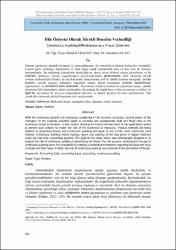Hile önleyici olarak sürekli denetim verimliliği
Künye
Karahan, M , Çolak, M . (2019). Hile Önleyici Olarak Sürekli Denetim Verimliliği . Afyon Kocatepe Üniversitesi Sosyal Bilimler Dergisi , 21 (2) , 561-572 . DOI: 10.32709/akusosbil.529906Özet
İşletme yapılarının giderek büyümesi ve karmaşıklaşması ile yöneticilerin işletme faaliyetleri üzerindeki
kontrol gücü, azalmaya başlamakta ve buna bağlı olarak işletmelerde hata ve hile riski de artmaya
başlamaktadır. Bu bağlamda işletmelerin büyüklüğü ne olursa olsun hilelerin ortaya çıkartılması ve bu
eylemleri önlemeye yönelik uygulamaların gerçekleştirilmesi gerekmektedir. Hile önlemede birçok
yöntem kullanılmakla birlikte en çok kullanılan yöntemlerden biri de sürekli denetim tekniğidir. Sürekli
denetim, gerçek zamanlı muhasebe sistemleri altında dijital ortamlarda verilerin kaydedilmesi,
raporlanması ve denetimini ifade etmektedir. Kavramsal olarak tasarlanan bu çalışmanın amacı, sürekli
denetimin hile önlemedeki rolünü incelemektir. Bu amaçla ilk olarak hata ve hile kavramları ve türleri ile
ilgili bir kavramsal bir çerçeve oluşturularak denetim ve sürekli denetim kavramı açıklanmıştır. Son
olarak hile önlemede sürekli denetimin rolü incelenmiştir. With the continuous growth and increasing complexity of the business structures, control power of the
managers on the business activities began to decrease and subsequently fault and fraud risks in the
businesses started to increase. In this context, eliciting the frauds and execution of the applications aimed
to prevent such actions no matter the size of the businesses is necessary. Various methods are being
utilized in preventing frauds and continuous auditing technique is one of the most commonly used
method. Continuous auditing means registry, report and auditing of the data given in digital mediums
under the real time accounting systems. The goal of this study which was conceptually designed is to
analyze the role of continuous auditing in preventing the frauds. For this purpose, auditing and concept of
continuous auditing were first explained by creating a conceptual framework regarding the fault and fraud
concepts and their types. Finally, the role of continuous auditing was analyzed in the prevention of frauds.
Kaynak
Afyon Kocatepe Üniversitesi Sosyal Bilimler DergisiCilt
21Sayı
2Bağlantı
https://dergipark.org.tr/tr/pub/akusosbil/issue/45362/529906https://hdl.handle.net/11630/9061
Koleksiyonlar
- Cilt 21 : Sayı 2 [20]



















